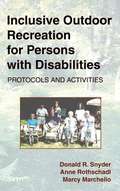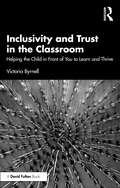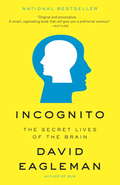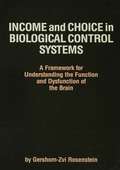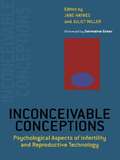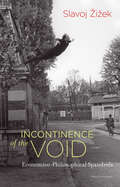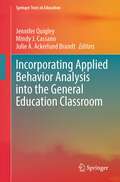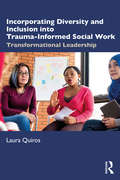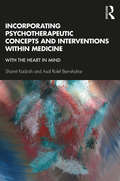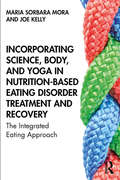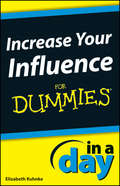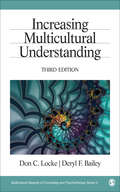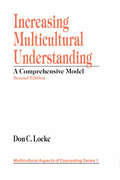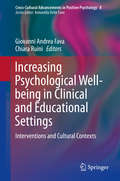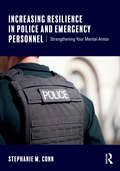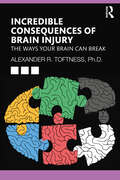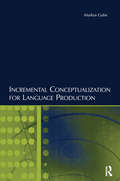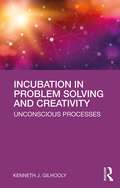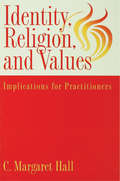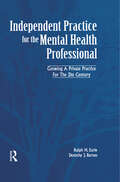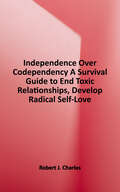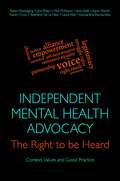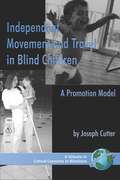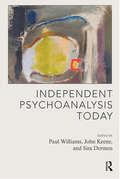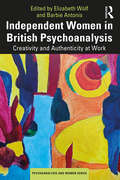- Table View
- List View
Inclusive Outdoor Recreation for Persons with Disabilities: Protocols and Activities
by Donald R. Snyder Anne Rothschadl Marcy MarchelloInstructors can use this text to teach program design principles. Practitioners can use the information to develop programs, services, protocols, and activities to better serve persons with disabilities in their use of the great outdoors.
Inclusivity and Trust in the Classroom: Helping the Child in Front of You to Learn and Thrive
by Victoria ByrnellDrawing from a wealth of specialist and mainstream school experience, this book intelligently synthesises ground-breaking research on teacher–student trust and learning to present innovative approaches to inclusive practice relevant to practitioners at all levels. Relational trust has critical implications for student engagement and learning, and new findings contribute insightfully to teacher approaches which are invaluable for practitioners at any stage of their career. The components of relational trust are clearly explained in this essential resource. Each theme is accompanied by a range of useful strategies which enable practitioners to deploy trust theory to develop a more sustainable education system. This thoughtful approach has the potential to shift educational priorities and advance equitable access to education for all students.
Incognito: The Secret Lives of the Brain
by David EaglemanIf the conscious mind--the part you consider to be you--is just the tip of the iceberg, what is the rest doing? In this sparkling and provocative new book, the renowned neuroscientist David Eagleman navigates the depths of the subconscious brain to illuminate surprising mysteries: Why can your foot move halfway to the brake pedal before you become consciously aware of danger ahead? Why do you hear your name being mentioned in a conversation that you didn't think you were listening to? What do Ulysses and the credit crunch have in common? Why did Thomas Edison electrocute an elephant in 1916? Why are people whose names begin with J more likely to marry other people whose names begin with J? Why is it so difficult to keep a secret? And how is it possible to get angry at yourself--who, exactly, is mad at whom? Taking in brain damage, plane spotting, dating, drugs, beauty, infidelity, synesthesia, criminal law, artificial intelligence, and visual illusions, Incognito is a thrilling subsurface exploration of the mind and all its contradictions.
Income and Choice in Biological Control Systems: A Framework for Understanding the Function and Dysfunction of the Brain
by Gershom-Zvi RosensteinThis volume introduces the concepts of income and optimal choice to the realms of brain activity and behavior regulation. It begins by developing the concept of the Income-Choice approach in the field of biological control systems, then deals with the problems of control of brain activity, and finally presents a model of behavior disturbance based on the idea that its cause is a definite and simple change in the income system of the organism. Other areas to which the proposed Income-Choice approach could be applied are also addressed including the origin of the epileptic aura and why it is a predictor of the imminent attack, the mechanism of the phenomena of "personality switching" in schizophrenics, and the possible connection between schizophrenic- like symptoms and epileptic status. Written nearly 20 years ago in Russia and now published in the West, this book will be of value to many professionals in related fields. This volume introduces the concepts of income and optimal choice to the realm of brain activity and behavior regulation. It begins by developing the concept of the Income-Choice approach in the field of biological control systems, then deals with the problems of control of brain activity, and finally presents a model of behavior disturbance based on the idea that its cause is a definite and simple change in the income system of the organism. Other areas to which the proposed Income-Choice approach could be applied are also addressed, including the origin of the epileptic aura and why it is a predictor of the would-be attack, the mechanism of the phenomena of "personality switching" in schizophrenics, and the possible connection between schizophrenic- like symptoms and epileptic status. Originally written nearly 20 years ago in Russia and now published for the first time in the West, this book will be of value to many professionals in related fields.
Inconceivable Conceptions: Psychological Aspects of Infertility and Reproductive Technology
by Jane Haynes Juliet MillerIt is over two decades since the first test-tube baby was born. During this period a new belief that all infertile women can now have babies has become widely accepted; indeed, infertile couples may feel great pressure to seek a medical solution. However, the psychological and social effects of the changing experiences of infertility remain confusing, both for those who experience infertility and for wider society. In this book, a distinguished range of contributors, including novelist Hilary Mantel and Germaine Greer, examine the experience of infertility from both male and female perspectives, the psychological aspects of infertility diagnosis and treatment, and the often radical and unexpected effects on kinship.Drawing from a wide range of theoretical backgrounds including Jungian, analytical, and compelling personal reflections, this book aims to unravel the implications of advancing reproductive technology for our understanding of ourselves and our families.
Incontinence of the Void: Economico-Philosophical Spandrels (Short Circuits)
by Slavoj ŽižekŽižek considers sexuality, ontology, subjectivity, and Marxian critiques of political economy by way of Lacanian psychoanalysis. If the most interesting theoretical interventions emerge today from the interspaces between fields, then the foremost interspaceman is Slavoj Žižek. In Incontinence of the Void (the title is inspired by a sentence in Samuel Beckett's late masterpiece Ill Seen Ill Said), Žižek explores the empty spaces between philosophy, psychoanalysis, and the critique of political economy. He proceeds from the universal dimension of philosophy to the particular dimension of sexuality to the singular dimension of the critique of political economy. The passage from one dimension to another is immanent: the ontological void is accessible only through the impasses of sexuation and the ongoing prospect of the abolition of sexuality, which is itself opened up by the technoscientific progress of global capitalism, in turn leading to the critique of political economy. Responding to his colleague and fellow Short Circuits author Alenka Zupančič's What Is Sex?, Žižek examines the notion of an excessive element in ontology that gives body to radical negativity, which becomes the antagonism of sexual difference. From the economico-philosophical perspective, Žižek extrapolates from ontological excess to Marxian surplus value to Lacan's surplus enjoyment. In true Žižekian fashion, Incontinence of the Void focuses on eternal topics while detouring freely into contemporary issuesfrom the Internet of Things to Danish TV series.
Incorporating Applied Behavior Analysis into the General Education Classroom (Springer Texts in Education)
by Jennifer Quigley Mindy J. Cassano Julie A. Ackerlund BrandtThis user-friendly textbook addresses the relevance of Applied Behavior Analysis (ABA) within the general education setting. Oftentimes, ABA is thought of as only applicable to those with autism spectrum disorder and other developmental disorders. In contrast, the application of ABA principles is appropriate for any socially significant problem, such as those that arise daily in the general education setting. This book will help educators, through individual and group interventions, decrease maladaptive behavior in their classrooms and to increase the focus on the curriculum.This book not only summarizes the basics of ABA technologies and methodologies but provides readers with: • Materials tailored to be used with any student by general education practitioners, teachers, and clinicians• Specific examples to ease the application of these technologies and curriculums• Templates to be individualized to each reader’s needs• A focus on the functionality and applicability of these programs Written in layman’s terms and broken down into categories of basic concepts and school-wide implementation, general educators will not only learn about ABA applications in education but will have clear examples of how to bridge the gap between understanding and application.
Incorporating Diversity and Inclusion into Trauma-Informed Social Work: Transformational Leadership
by Laura QuirosIncorporating Diversity and Inclusion into Trauma-Informed Social Work incorporates discussions of leadership, racism and oppression into a new understanding of how trauma and traumatic experience play out in leadership and organizational cultures. Chapters unpack ideas about the intersections of self, trauma and leadership, bridging the personal and professional, and illustrating the relationship between employees and leaders. Discussion questions and reflections at the end of each chapter offer the opportunity for the reader to understand their own vulnerabilities in relation to the subject matter. This book reconceptualizes cultural competency, trauma and leadership in the context of the 2020 COVID-19 pandemic and views theories and practices through a lens of diversity and inclusivity. Incorporating Diversity and Inclusion into Trauma-Informed Social Work is an expansive guide for students in social work, one that explores and explains how trauma and difference manifest in how we communicate, lead and work with each other.
Incorporating Psychotherapeutic Concepts and Interventions Within Medicine: With the Heart in Mind
by Shamit Kadosh Asaf Rolef Ben-shaharThis book provides doctors with insights into psychological and relational dynamics to better understand themselves and their patients, deepen their understanding of somatic and psychic dimensions of illness, and give them diagnostic and therapeutic tools to design better treatment procedures for patients. In the first part of the book, the authors explore cognitive, emotional, and somatic strategies that are supportive of doctors’ well-being. In the second part, they introduce theoretical knowledge and applicable skills from psychotherapy that can illuminate the complexity of the doctor-patient relationship, broaden doctors' approaches, and upgrade their communicative skills. The third part introduces some of the basic tenets of somatic psychotherapy that can deepen doctors' understanding of symptoms and illness, providing them with richer therapeutic tools and a deeper knowledge of bodily and psychological aspects, interweaving in a variety of medical conditions. This text not only provides a helping hand to both doctors and psychotherapists in designing an amalgamated approach to clinical treatment but also provides doctors with better tools for understanding and managing the intricacies of the doctor-patient relationship.
Incorporating Science, Body, and Yoga in Nutrition-Based Eating Disorder Treatment and Recovery: The Integrated Eating Approach
by Joe Kelly Maria Sorbara MoraIncorporating Science, Body, and Yoga in Nutrition-Based Eating Disorder Treatment and Recovery is a valuable, innovative guide that demonstrates how clients and clinicians can untangle, discern, and learn from the complex world of eating disorders. With voices from every stage of recovery, this book illustrates how clients can claim mastery in food and life. As a nutritionist who specializes in disordered eating, the holistic method Ms. Mora created provides individuals with a true potential for healing. Incorporating Science, Body, and Yoga in Nutrition-Based Eating Disorder Treatment and Recovery weaves strong, resilient, and vibrant threads of science, dietetic practice, and yoga therapy that harmonize with all treatment modalities. It will help treatment providers from every discipline to guide clients as they reweave their lives with nourishing relationships, embodiment, and ongoing growth.
Increase Your Influence In A Day For Dummies (In A Day For Dummies)
by Elizabeth KuhnkeMany people want to gain trust or support in business and throughout life, but the true skill is doing so in a charming fashion! Whether you're convincing the boss about your much-deserved promotion or a busy restaurateur to offer a better table, the ability to influence those around you can help improve and increase your successes. Increase Your Influence In a Day For Dummies is a cut-down version of Persuasion & Influence For Dummies. It covers: Laying the groundwork for persuasion and influence Getting things done with the help of others Quietly creating big change Online content: 10 Sure fire ways to influence anyone
Increasing Multicultural Understanding
by Dr Don C. Locke Dr Deryl F. BaileyIncreasing Multicultural Understanding, Third Edition provides the necessary tools to foster positive and productive relationships among culturally diverse populations. Authors Don C. Locke and Deryl F. Bailey encourage readers to explore their own cultural background and identity, and in the process, begin to better understand others. A best-seller in the first and second editions, this revised and expanded third edition continues to present its classic framework for critical observation with at least 10 elements, including: the history of oppression, religious practices, family structure, degree of acculturation, poverty, language and the arts, racism and prejudice, sociopolitical factors, child-rearing practices, and values and attitudes.
Increasing Multicultural Understanding: A Comprehensive Model (Multicultural Aspects of Counseling And Psychotherapy #1)
by Dr Don C. LockeAll chapters in this Second Edition of Increasing Multicultural Understanding have been revised and updated, and there are two new chapters on Muslims and Jews in the United States. The author presents a model which helps counsellors understand culturally different groups and the role culture plays in shaping the way people think, feel and act, and which provides the tools necessary for fostering positive and productive relationships among culturally diverse populations.
Increasing Psychological Well-being in Clinical and Educational Settings
by Giovanni Andrea Fava Chiara RuiniThis volume deals with strategies aimed at increasing psychological well-being in both clinical and non-clinical settings, with a special focus on the impact of cross-cultural influences on these processes. Consisting of two parts, the book first examines clinical interventions for increasing well-being and positive functioning in adult populations. It looks at cultural differences in the experience of psychological well-being, presents an analysis of the concept of psychological well-being and discusses various interventions, including Well-Being Therapy and Cognitive Behavioral Therapy. Other concepts discussed are post-traumatic growth, wisdom and motivation. The second part of the book deals with psychological interventions in childhood and adolescence and has a strong emphasis on educational settings. It provides an overview of the main evidence-based psychotherapies for affective disorders in youths, and looks at the importance and impact of positive education, resilience, and hope. The book presents models for intervention and discusses several therapies in detail.
Increasing Resilience in Police and Emergency Personnel: Strengthening Your Mental Armor
by Stephanie M. ConnIncreasing Resilience in Police and Emergency Personnel illuminates the psychological, emotional, behavioral, and spiritual impact of police work on police officers, administrators, emergency communicators, and their families. Author Stephanie Conn, a clinician and researcher as well as a former police officer and dispatcher, debunks myths about weakness and offers practical strategies in plain language for police employees and their families struggling with traumatic stress and burnout. Sections of each chapter also offer guidance for frequently overlooked roles such as police administrators and civilian police employees. Using real-world anecdotes and exercises, this book provides strengths-based guidance to help navigate the many complex and sometimes difficult effects of police and emergency work.
Incredible Consequences of Brain Injury: The Ways your Brain can Break
by Alexander R. ToftnessIncredible Consequences of Brain Injury: The Ways your Brain can Break explains the acquired brain disorders that can suddenly change a person’s life. Underlining the intricate workings of the human brain and the amazing things it does every day, this book examines what happens when the brain stops functioning as it should. Through the use of case studies and historical examples, this concentrated collection of different neuropsychological conditions provides the reader a glimpse into the lived experiences of each disorder. Each chapter is firmly rooted in relevant neuropsychological literature combined with easy-to-understand explanations and guided reflection. In its essence, this book is a celebration of the human brain and the myriad factors that make it up, serving to maintain hope in recovering from brain conditions, and to marvel at the intricate workings of the brain. This valuable compendium is essential for anyone who wants to learn more about how the brain functions and dysfunctions and will be equally useful for students, instructors, and healthcare workers. It will further be of use to individuals with brain conditions and their dear ones and for the individuals who are interested in learning more about the human brain.
Incremental Conceptualization for Language Production
by Markus GuheIncremental Conceptualization for Language Production discusses the simultaneous actions involved in thinking and speaking, as well as the piecemeal way in which individuals construct an internal representation of the external world and use this internal representation for speaking. Author Markus Guhe presents the first computational model that captures these observations in a cognitively adequate fashion. The volume is an innovative look at the mind’s process of producing semantic representations that can be transformed into language. The first section of the book illustrates four stages of conceptualization: construction of a conceptual representation; selection of content to be verbalized; linearization of the selected content; and generation of preverbal messages. Guhe then analyzes incremental processing — processing that takes place in a piecemeal fashion — and offers a blueprint of incremental models while discussing the dimensions along which the processing principles and the blueprint varies. Finally, incremental processing and conceptualization merge to form the incremental conceptualiser model (inC). The effective use of inC is demonstrated through simulations carried out with the implementation of the model. Intended for researchers in cognitive science, particularly cognitive modeling of language, this volume will also interest researchers in artificial intelligence, computational linguistics, psycholinguistics, and linguistics and psychology.
Incubation in Problem Solving and Creativity: Unconscious Processes
by Kenneth J. GilhoolyCan problems be solved by setting them aside or by sleeping on them? Incubation, the process of stopping conscious work on problems for a set period of time, is an integral part of the creative problem solving process. Providing an overview of the main issues, findings and implications of cognitive research on incubation effects in problem solving and creativity, this book argues that incubation is an effective strategy for tackling problems that do not yield to initial solution attempts. Gilhooly reasons that unconscious work is automatic and explores the underlying processes involved in incubation, providing evidence to showcase the major role of unconscious processing in problem solving. Incubation in Problem Solving and Creativity concludes with a discussion of the implications of unconscious work theory for enhanced problem solving, positioning incubation as an effective and important stage in creative problem solving. This book is an invaluable resource for students and researchers of problem solving, creativity and thinking and reasoning as well as for students from all disciplines taking problem solving modules.
Indentity, Religion And Values: Implications For Practitioners
by C. Margaret HallThis handbook for clinicians focuses on the impact of religion and spirituality on the client, using the clinical sociological theory of identity empowerment. The ten concepts of this theory show how identity can be expressed in value choices: self; dyad; triad; family; religion; definition of the situation; reference group; class culture; and society. The professor includes case studies and strategies for intervention at the end of each cahpter.
Independant Practice for the Mental Health Professional
by Ralph Earle Dorothy BarnesMarketing, office planning, networking, managed care, legal liability. These are probably not the words that encouraged your decision to pursue a career in the field of mental health. Before practicing the clinical aspects of therapy, most mental health professionals must first deal with the business of therapy. Independent Practice for the Mental Health Professional, co-written by a veteran therapist and a therapist just beginning in her practice, offers the information needed to balance the demands of running a business along with being a therapist. Based on Joan Beigel and Ralph Earle's previous work, Successful Private Practice in the 1990s, this book offers specific tools for building a successful private practice for the next century.Independent Practice for the Mental Health Professional provides the reader with the experience and time-tested lessons of one author who has been in practice since 1971. At the same time, the co-author, who began her practice in May 1998, addresses the thoughts and concerns of those therapists soon to enter, or thinking about entering, private practice. In this book, readers will learn· the pros and cons of going solo or joining a group practice· the legal issues connected to running a private practice· how to market themselves as well as their practice· how to arrange physically their office, manage personnel, and collect fees· how to maintain a thriving practice in the age of managed careThe authors provide worksheets and examples of successful planning for the growth of a practice. When combined with hard work and a business-minded attitude, these techniques can be a recipe for success. As a result, this book is a valuable resource for therapists thinking about entering private practice, and beginning and experienced therapists hoping to improve their own practice.
Independence Over Codependency: A Survival Guide to End Toxic Relationships, Develop Radical Self-Love, Stop People Pleasing, and Learn How to Set Healthy Boundaries
by Robert J. CharlesIn this book, you'll learn the rudiments of codependency and how it operates. Have you ever looked at your current or past relationships and wondered why you behaved the way you did? No one sets out to become obsessive when they start to care for someone, but for some of us, it seems like we often find ourselves there, in a state of obsession. So, how did you get there? This book will provide you with that answer.
Independent Mental Health Advocacy - The Right to Be Heard: Context, Values and Good Practice
by Karen Newbigging Konstantina Poursanidou Karen Machin Toby Brandon Stephanie De Haye Julie Ridley Laura Able Mick Mckeown Kaaren Cruse June Sadd Kris ChasteyIndependent mental health advocacy is a crucial means of ensuring rights and entitlements for people sectioned under the Mental Health Act. This book takes an appreciative but critical view of independent mental health advocacy, locating the recent introduction of Independent Mental Health Advocates (IMHAs) within a broader historical, social and policy context, and anticipates future developments. The text includes the voices of service users throughout, both as authors and research participants. Drawing on their research, the authors provide a historical overview of mental health advocacy, independent mental health advocacy in relation to the law, the role and responsibilities of IMHAs, essential values, knowledge and skills required of advocates, relationships with service providers, commissioning, measuring advocacy outcomes, and how IMHA services can be made accessible and appropriate to diverse groups. This will be essential reading for advocates, social work professionals, academic staff and trainers and will provide mental health professionals with an understanding of, and critical reflection on, the IMHA role. It will also be of particular general interest to survivors and mental health service users, and their families and carers.
Independent Movement and Travel in Blind Children: A Promotion Model
by Joseph CutterAn innovative guide to encouraging activity, movement, and independence in the young blind child and full of creative ideas, this book provides guidance for parents, teachers, instructional assistants, physical therapists, teachers of the blind, and O&M instructors who desire to create a learning environment in which the blind child can become curious, involved, active and independent.
Independent Psychoanalysis Today
by Paul Williams John Keene Sira DermenIndependent Psychoanalysis Today is a book that shows how contemporary Independent psychoanalysts think and work. There are three themes to the book: Independent thinking including the theory of technique; exploration of clinical concepts and demonstrations of ways of working by some of the most prominent Independent clinicians practicing today; finally, the evolution and enduring impact of Independent ideas and the influence of past Independents on present ways of working.
Independent Women in British Psychoanalysis: Creativity and Authenticity at Work (Psychoanalysis and Women Series)
by Elizabeth Wolf Barbie AntonisIndependent Women in British Psychoanalysis celebrates the lives and work of female psychoanalysts whose significant contributions to the Independent Tradition have hitherto been overshadowed by their male counterparts. The contributors in this volume look at seven female psychoanalysts who broke new ground with their contributions to theory and practice: Ella Freemen Sharpe, Marjorie Brierley, Paula Heimann, Marion Milner, Enid Balint, Nina Coltart and Pearl King. The chapters tell the individual stories of these psychoanalysts alongside their theories, showing how their personal lives embody and illustrate the essential universal developmental task of becoming oneself and finding one’s own voice. The themes across the chapters include infant and child development with (m)other, trauma, constructive use of aggression, creativity, a theory of clinical technique, and independence of mind in a social world. This book will be of interest and relevance to psychoanalysts and psychotherapists, developmental psychologists, sociologists, group analysts and historians of psychoanalysis, as well as those interested in feminism and women’s position in society.
